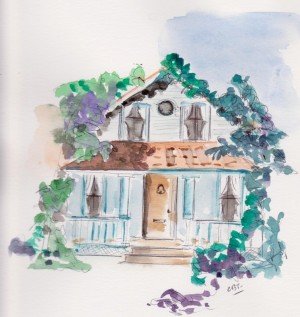Running your own business, being self-employed.
 A bit of a sweeping statement, but I sometimes think that only people who run their own businesses really know what work is. If you are employed by somebody else, you go in to work, do whatever it is you have to do, then go home again. You get paid for it. It may be easy stuff or difficult stuff, but essentially you get paid for a specific job and it is up to you to do it properly.
A bit of a sweeping statement, but I sometimes think that only people who run their own businesses really know what work is. If you are employed by somebody else, you go in to work, do whatever it is you have to do, then go home again. You get paid for it. It may be easy stuff or difficult stuff, but essentially you get paid for a specific job and it is up to you to do it properly.
People who run their own businesses have to create a situation, in our case out of thin air, out of which they can earn some money. Nobody said to us “do this and I will pay you for it”. We had to cause ourselves to be paid. I, in the first instance, had to persuade my client (having got the client at all) to buy a house in France. Not just any house in France, but a house on my books. In order to get to this situation I first had to place advertisements in magazines and newspapers in the UK. This was long before the internet. I then had to answer the phone, the fax and the post several hundred times, enclosing details of five or six properties each time, in order to get one solitary client into my car. I worked out that for every 200 sets of details I posted, I got one client. Out of the clients who got as far as looking at properties with me, about one in every seven would buy.
Having got the client to agree to buy something – invariably an old fermette in need of repairs – I then had to get them to sign papers called a Compromis de Vente, which is a kind of promise to buy. At that stage I also had to persuade them to part with a cheque for 10% of the value of the property. This was sometimes done in the office of a notaire, but was also regularly done in my own little office at Tulips with the washing machine chugging away in the background , the smell of burnt toast and the sound of children playing. The cheque was always made out to the notaire. From that moment responsibility should have fallen off my shoulders and onto his, though it never really did, and it was his job to do a search while I kept the clients informed.
Of course, the clients always referred back to me, from sensible questions like the perimeter fences to silly questions about the height of the skirting boards. If something went wrong it was always my fault – even the weather seemed to be my domain – and people never wanted to pay for anything.
It was, however, a neat little business. My clients looked to me for sorting out utilities and insurances for their properties, and I was able to make a small charge which helped to swell my commission a little and – Lord knows – we needed every penny.
And before all this, of course, I had to find the property for sale, negotiate a sensible price with the vendor whereby he would get what he wanted and I would pick up a commission, take photos, type up details, photocopy them. The properties were all over the place, as much as an hour’s drive away. As time wore on I learnt to not go further than half an hour in any one direction which gave me a good enough catchment area. Sometimes I would go to great lengths – taking Bernie to the child minder and making a detour into Tonnay Boutonne for another film for the camera, then drive off using up my precious petrol, only to find that the property was totally unsuitable for sale to the British. I rapidly learnt that the vendor’s description over the phone was utterly meaningless.
Extract taken from “A Call from France” by Catherine Broughton, available from most usual sources
http://www.amazon.co.uk/Call-France-Catherine-Broughton-ebook/dp/B00IOMHQOO/ref=sr_1_2?ie=UTF8&qid=1405239008&sr=8-2&keywords=Catherine+broughton






